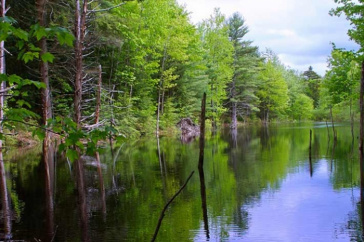The University of New Hampshire is a flagship research university that inspires innovation and transforms lives in our state, nation and world. More than 16,000 students from all 50 states and 71 countries engage with an award-winning faculty in top ranked programs in business, engineering, law, health and human services, liberal arts and the sciences across more than 200 programs of study. UNH’s research portfolio includes partnerships with NASA, NOAA, NSF and NIH, receiving more than $100 million in competitive external funding every year to further explore and define the frontiers of land, sea and space.
UNH Bee Lab Hosts New England Bee Bioblitz in Cheshire County June 22-24

Pisgah State Park. Credit: New Hampshire Department of Natural and Cultural Resources
DURHAM, N.H. – New England bee enthusiasts will head to Cheshire County in mass for the 2018 Annual New England Bee Bioblitz organized by the University of New Hampshire Bee Lab and supported by the New Hampshire Agricultural Experiment Station. The event takes place at Pisgah State Park June 22-24, 2018, and is free and open to the public.
The bee bioblitz is organized by Sandra Rehan, assistant professor of biological sciences. Now in its fourth year, it has provided critical information that has allowed Rehan and her lab to be the first to assess the state’s native bee population as well as conclude that the state has seen a drastic decline in bumble bees.
The goals are to document the diversity of bee species in the state, with a particular focus on native bees; connect bee researchers across New England; and demonstrate bee surveys and research techniques to interested members of the public and students.
“The aim of our overall research is to restore and rejuvenate healthy plant pollinator habitats to increase local pollinator populations. By educating New Hampshire municipalities, farmers, and policy makers about native pollinators and habitat preferences, we can encourage the regional and national authorities to create and maintain native bee habitats,” Rehan said.
Bees are important pollinators of food crops and natural ecosystems. The value of pollination to agriculture is estimated at more than $200 billion a year worldwide. The abundance of and diversity of pollinators are declining in many agricultural landscapes across the U.S. leading to concern about a global pollinator crisis.
According to the New Hampshire Department of Natural and Cultural Resources, Pisgah State Park in Winchester includes more than 13,300 acres of rough forested terrain, encompassing a complete watershed north of the Ashuelot River. Within the Cheshire County towns of Winchester, Chesterfield and Hinsdale, the park protects seven ponds (popular for fishing), four highland ridges and numerous wetlands. The area's 21 square miles and six trailheads make it the largest property in the state park system.
The home base for the event will be the Ashuelot River Campground. Basic campsites and cabins are available; please contact the campground directly for any bookings. There are indoor showers and restrooms on site. Attendees must provide their own food.
Permits are required for collecting on public lands so attendees should contact Rehan if they are interested in participating or for more information.
This material is based upon work supported by the NH Agricultural Experiment Station, through joint funding of the National Institute of Food and Agriculture, U.S. Department of Agriculture, under award number 1004515, and the state of New Hampshire.
Founded in 1887, the NH Agricultural Experiment Station at the UNH College of Life Sciences and Agriculture is UNH’s original research center and an elemental component of New Hampshire's land-grant university heritage and mission.
PHOTOS AVAILABLE FOR DOWNLOAD
https://colsa.unh.edu/nhaes/sites/default/files/media/images/pisgah-state-park.jpg
https://colsa.unh.edu/nhaes/sites/default/files/media/images/pisgah-state-park2.jpg
Pisgah State Park. Credit: New Hampshire Department of Natural and Cultural Resources
-
Media Contact
Lori Tyler Gula, PhD | NH Agricultural Experiment Station | lori.gula@unh.edu | 603-862-1452
Latest News
-
June 18, 2024
-
June 18, 2024
-
May 17, 2024
-
May 14, 2024
-
May 7, 2024

















































